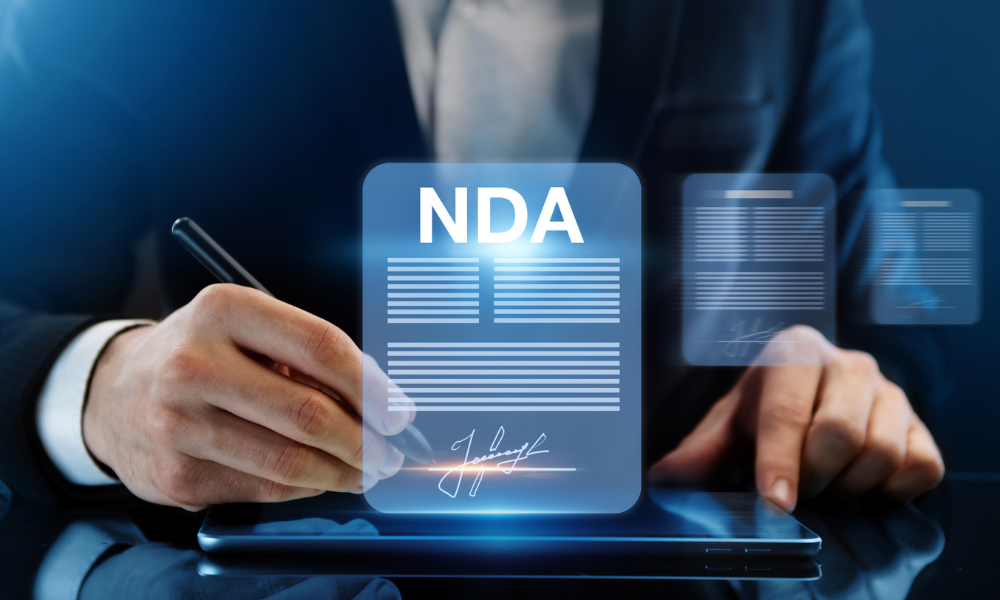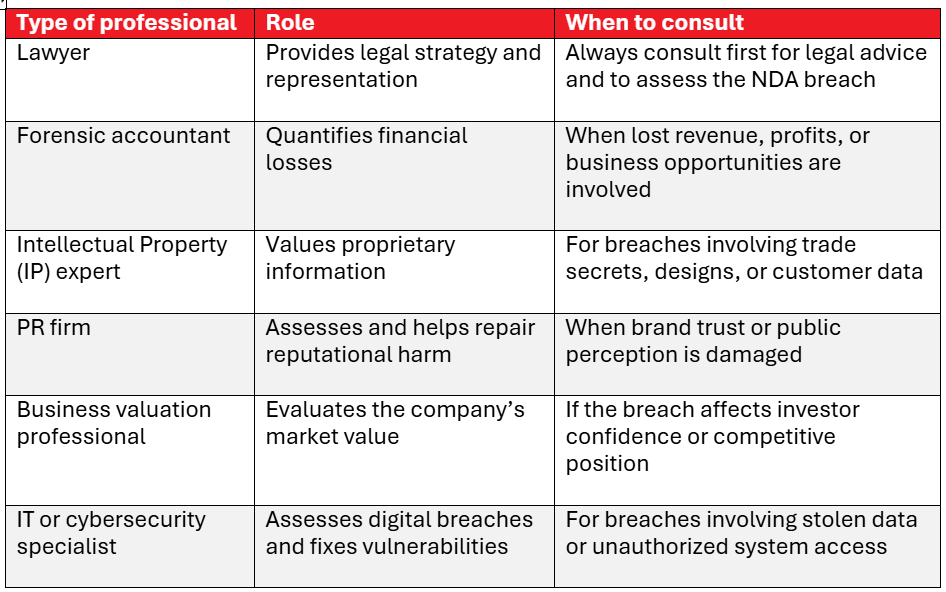
Explore whether non-disclosure agreements are upheld in court. Understand their legal standing and how they safeguard your sensitive information

Non-disclosure agreements or NDAs are used to protect an organization’s confidential information and trade secrets. The story goes that the earliest NDAs were used by shipping companies to keep the trade routes to Malacca secret.
NDAs have come a long way since then. Today, non-disclosure agreements are part and parcel of most employment contracts. According to the Federation of American Scientists, 33% to 57% of US workers are under some form of NDA. Based on these figures, there’s a good chance you’ll need help drafting an NDA.
In this article, we’ll cover the basics of NDAs. We’ll answer the question: do non-disclosure agreements hold up in court?
We’ll also go over some high-profile examples of cases where NDAs were broken and where they were challenged. They should serve as case studies for your company of what to do and what to avoid when handling NDAs.
A non-disclosure agreement (NDA) is a contract that protects confidential information shared between two groups: the disclosing party and the receiving party.
The disclosing party shares information with the receiving party as part of a business deal or transaction such as:
There are two types of NDAs:
For a more in-depth look at NDAs, read our explainer on non-disclosure agreements.
NDAs are contracts, which means they are legally binding. They should have the usual elements under contract law, such as:
Apart from these elements, an NDA must also be specific enough to hold up in court. We’ll get into more detail on that point later.
Many industries use NDAs when hiring employees, dealing with contractors, or entering business deals. These contracts are used when individuals have access to sensitive information such as:
NDAs are commonly used in the tech, media, and entertainment industries. An NDA prevents employees from sharing sensitive information with others.
In general, non-disclosure agreements will hold up in court if they:
Let’s go over each of these points in more detail:
The NDA should not be too broad – it should provide enough detail for both parties, such as:
NDAs should be detailed, but not too specific. In workplace NDAs, employees should not feel restricted in exercising their right to free expression or to form unions. An example is Meta’s confidentiality agreements, which the National Labor Relations Board (NLRB) found to be unlawful.
Just like any contract, a non-disclosure agreement holds up in court if it is signed by the relevant parties. That’s the receiving party for a unilateral NDA and both the disclosing and receiving parties for a bilateral NDA.
A signature could be a physical or electronic signature. Under the ESIGN Act, electronic signatures are legal throughout the United States where federal laws apply.

In cases where federal law doesn’t apply, the Uniform Electronic Transactions Act (UETA) is the prevailing law. The UETA also recognizes electronic signatures as valid.
No one should be forced to sign a non-disclosure agreement. This could make the NDA unenforceable.
While the disclosing party has no obligation to sign a unilateral NDA, they should still keep the stated information confidential. This leads us to our next point.
For a non-disclosure agreement to hold up in court, the information it stated as confidential must remain as such. If the disclosing party shares that information with others, the validity of the NDA may be challenged.
NDAs don’t apply to information that’s already in the public domain.
Non-disclosure agreements are not enforceable if they are used to cover up crimes or illegal activity. Most US states have rules on public policy. This means contracts can be voided if they cover up criminal activities or violate an individual’s right to speak up against illegal acts.
Non-disclosure agreements are civil documents. Those who breach NDAs do not go to prison, unless the breach leads to a criminal act like stealing trade secrets.
Breaking an NDA usually results in:
Let’s take a look at some cases where NDAs were breached and where they were challenged due to unlawful activity. We’ll see how the outcomes vary, depending on whether any criminal cases were linked to the violations.
In these examples, the NDA breaches resulted in criminal acts, leading to legal action. Both involve high-profile personalities in the security and tech spheres.
Edward Snowden was a former NSA contractor and CIA employee who leaked classified documents in 2013. These exposed surveillance programs by the National Security Agency around the world. He was charged with espionage for this act.
In September 2019, Snowden published a memoir titled Permanent Record. At that point, the US filed a civil lawsuit against Snowden for violating the NDAs he had signed with the NSA and the CIA. According to the lawsuit, the NDAs required Snowden to submit a draft of the book for review before being published. Snowden did not do this, resulting in a breach of his NDAs.
The following year, the courts ruled in favor of the US government. In the ruling, Snowden must pay the US government $5.2 million from royalties in book sales and earnings from 56 speeches.
Key takeaway: Breaching an NDA could mean having to pay millions of dollars in restitution.
Is there a difference between confidentiality agreements and NDAs? Find out in the article.
Anthony Levandowski was one of Google’s star engineers who worked on its self-driving car. As part of his work, he signed an NDA not to take or share information related to the project. He was part of the team from 2009 to 2016.
When he left Google in 2016, he downloaded over 14,000 Google files and used this information for his own startup.
In 2019, the US District Attorney filed criminal charges against Levandowski: 33 counts of theft and attempted theft of trade secrets. To avoid a lengthy trial, Levandowski pleaded guilty to one count. The prosecution agreed to drop the other 32 charges.
In 2020, Levandowski was sentenced to 18 months in prison. He was ordered to pay a fine of $95,000 and restitution worth almost $760,000 to Google. He did not start serving his sentence right away due to Covid-19, and he was pardoned by ex-President Trump in 2021.
Key takeaway: When an NDA breach involves stealing trade secrets, that will lead to a criminal case with prison time and huge penalties.
Non-disclosure agreements are standard practice in Hollywood. Multi-million productions and casting coups are protected by NDAs, and top producer Harvey Weinstein took advantage of this.
In 1998, Weinstein made his assistants Zelda Perkins and Rowena Chiu sign NDAs to cover up his attempt to rape Chiu. Both women received GBP125,000 each for keeping quiet.
Perkins broke her NDA in 2017, speaking with journalists about Weinstein’s behavior. This act inspired other women to come forward, which led to Weinstein being charged with multiple counts of rape and sexual assault. He was eventually convicted and has started his prison sentence.
Perkins launched Can’t Buy My Silence with Canadian law professor Julie Macfarlane to stop using NDAs to cover up sexual abuse.
Key takeaway: The NDA process was abused by Weinstein to mask his predatory behavior. NDAs do not hold up in court if they are used to cover up criminal acts like Weinstein did.
Federal prosecutors allege that former Abercrombie & Fitch CEO Mike Jeffries and his associates were involved in sex trafficking from 2008 to 2015.
The indictment claims that Jeffries required the alleged victims to sign NDAs. This prevented them from speaking about their involvement, even with family or friends. This created a barrier to reporting criminal activity.
Prosecutors argue that these NDAs were used unlawfully to silence victims.
Key takeaway: NDAs cannot legally be enforced to cover up illegal activities like sex trafficking. Non-disclosure agreements used in this way will not hold up in court.
NDAs are enforceable and can be held up in court if they are clear, specific, and signed by the relevant parties. Non-disclosure agreements that don’t meet these criteria may be challenged in court.
NDAs that go against public interest and cover up criminal activity are not enforceable.
If one of your employees or contractors breached their NDAs, here’s what you should do:
Document instances when the NDA was breached. This might look like:
You may need to investigate. Look for evidence to confirm that a breach took place:
It’s important to identify which part of the NDA was breached. This specific bit of information is vital when you move forward with any action.
At this point, you may want to think about hiring legal counsel.
Send the violating party a cease and desist letter. This is a formal notice demanding that they stop the unlawful activity right away. The letter includes:
A cease and desist letter helps avoid costly and time-consuming trials if the offending party follows the order.
An injunction orders the other party to stop sharing confidential information further. This can help prevent any more damage or losses. An injunction can take one of these forms:
Consult your lawyer to find out what approach to take at every stage of the case.
This is an option especially if the breach resulted in lost income or damage to your company’s reputation. To establish financial losses, consider these factors:
Depending on the scope of the breach, you may want to consult a team of professionals to help place a price tag on the damage. Your team might include:

In seeking input from these experts, you can be confident that the amount you'll be seeking in damages is fair and proportionate.
Mediation and arbitration can help resolve the dispute while avoiding a time-consuming and expensive trial. These forms of alternative dispute resolution (ADR) are helpful especially if both parties are willing to negotiate.
That sums up steps to take in enforcing an NDA. The process may vary, depending on which state the NDA is being applied in.
If the NDA was drafted in one state and enforced in another, it’s best to consult lawyers in each of these states.
Like any other contract, NDAs should be clear and specific. These should outline what information is confidential, what the penalties are for violating the agreement, and the time limits for keeping that information secret. Be clear on the intentions behind these NDAs. If they go against public interest or cover up criminal acts, they will not be upheld in court.
Make sure your organization’s NDAs are iron clad. Be clear and thorough in your language. Consult a lawyer to guide you in drafting an NDA. They can advise you on what a good NDA looks like based on your organization’s needs.
Do you know of other cases where non-disclosure agreements were not held up in court? Let us know in the comments below